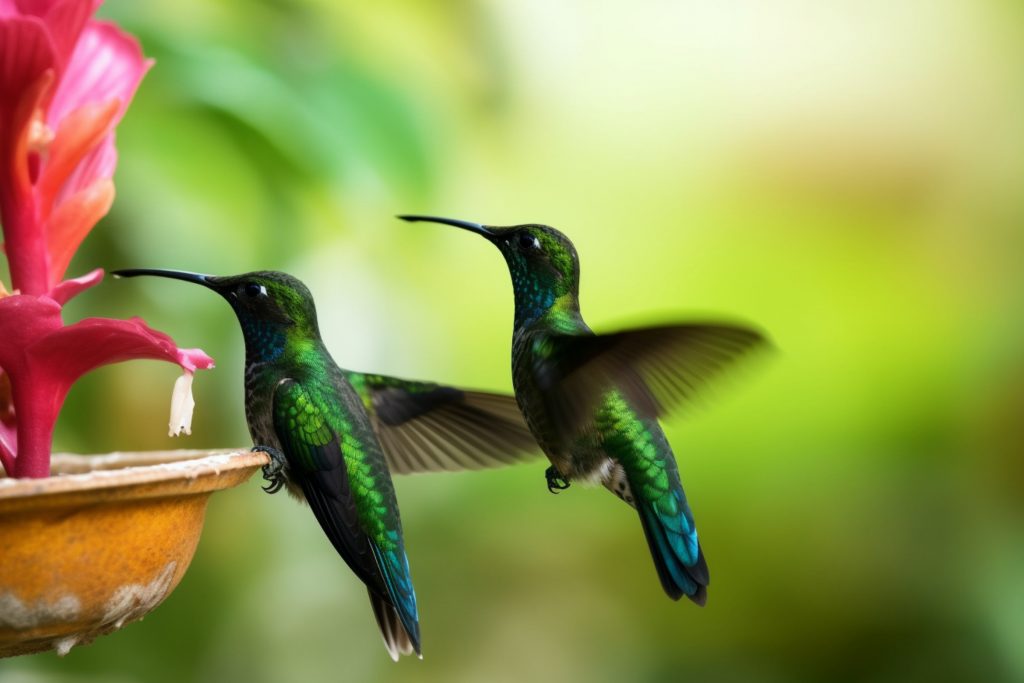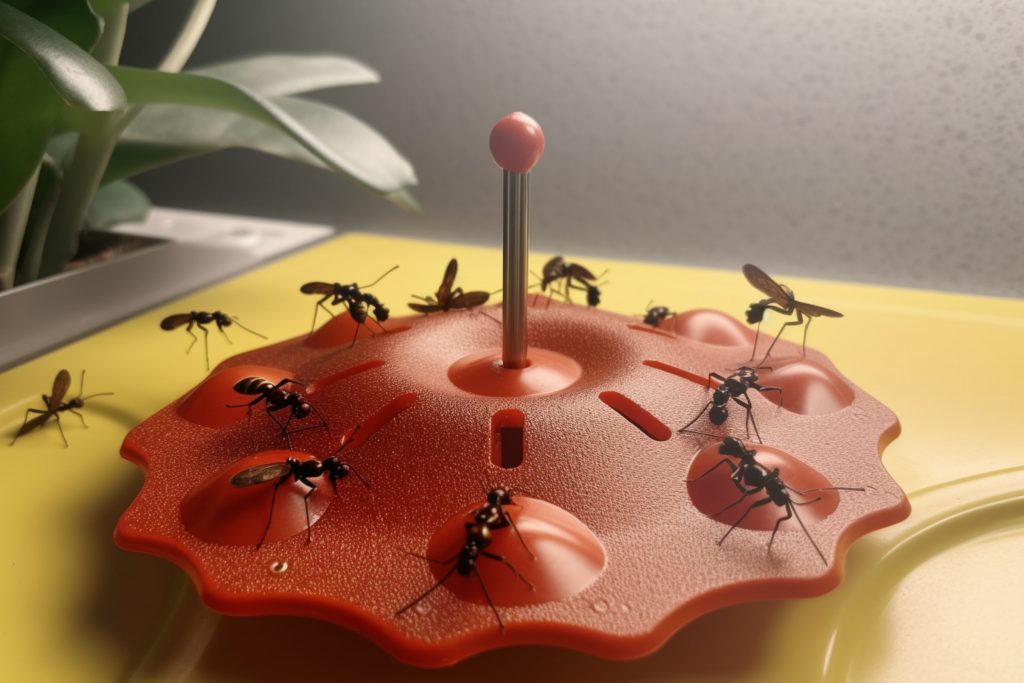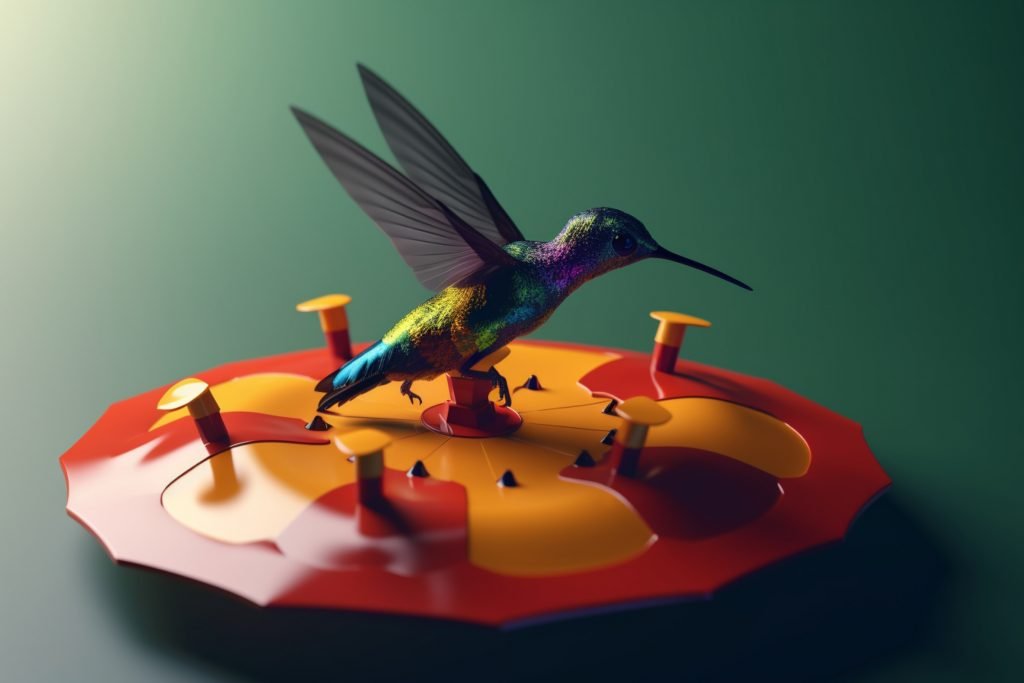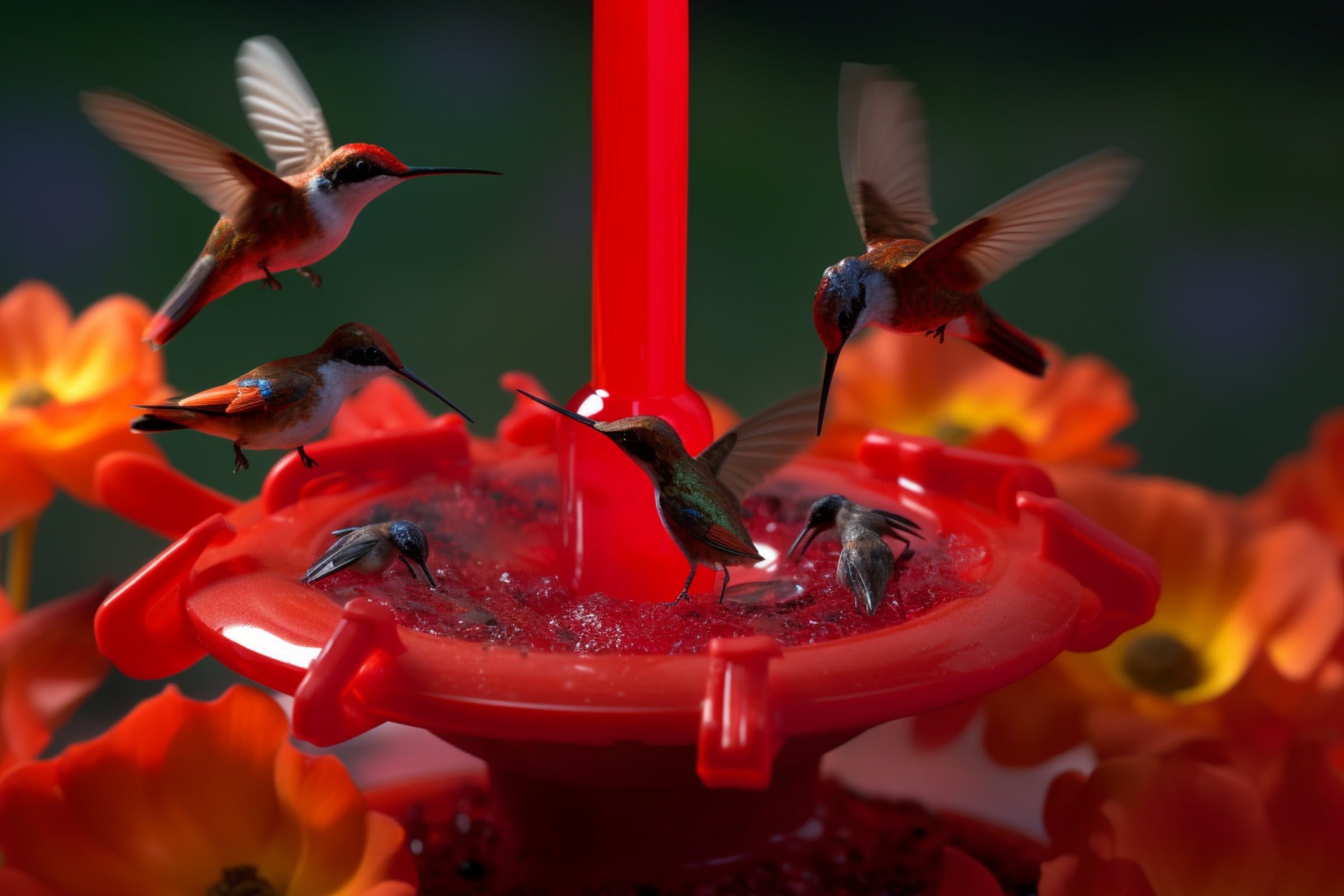Have you ever found yourself wondering, do hummingbirds eat ants? While hummingbirds are renowned for their diet of nectar from flowers and sweet sugar water from hummingbird feeders, they indeed do consume a wide variety of insects, including ants, for their protein needs.
In this blog post, we will explore the world of these enchanting birds, diving into the intricate details of their diet, the issues hummingbird feeder owners face with ant invasions, and the fascinating relationship between these swift flyers and the ants they share their environment with.
Also, we’ll go through ways to maintain ant-free hummingbird feeders and finish off with a thoughtful reflection on how these small interactions illuminate our relationship with the larger natural world.
- Hummingbirds and Ants: A Complicated Coexistence
- The Ant Problem in Hummingbird Feeders
- Solutions to Keep Ants Away from Hummingbird Feeders
- Essential Feeder Maintenance
- Final Thoughts
- FAQs – Do Hummingbirds Eat Ants?
- Q: Do hummingbirds eat ants?
- Q: What is the main food source for hummingbirds?
- Q: Why are ants attracted to hummingbird feeders?
- Q: How can I keep ants away from hummingbird feeders?
- Q: What is an ant moat, and how does it work?
- Q: Can slippery substances deter ants from bird feeders?
- Q: How often should I clean my hummingbird feeder?
- Q: Are there other insects that hummingbirds eat?
- Q: What is an effective natural insect repellent for hummingbird feeders?
- Q: Are ants beneficial to hummingbirds in any way?
- Q: Are all hummingbird species insectivorous?
- Q: Can the location of a hummingbird feeder affect ants attraction?
- Q: How does an ant guard work?
- Q: Can hummingbirds eat aggressive ant species?
- Q: What alternatives to water moats can I use to deter ants from my hummingbird feeder?
- Q: Can the type of feeder affect the attraction of ants?
- Q: Does the presence of ants deter hummingbirds from feeders?
- Q: Is flower nectar or sugar water better for hummingbirds?
- Q: What role does direct sunlight play in attracting ants to hummingbird feeders?
Related post to read: How To Keep Ants Off Hummingbird Feeder.

Hummingbirds and Ants: A Complicated Coexistence
Hummingbirds, some of the most beautiful birds graced with colourful feathers and yellow accents, and ants, the industrious insects, have a complicated coexistence. Hummingbirds are not only nectarivorous but also insectivorous birds, which means in addition to the sweet nectar from flowers, they supplement their diet with various insects.
This additional food choice, primarily small-winged insects, adult insects, and insect eggs, provide necessary proteins and fats. Among these, ants can be a vital food source for many hummingbird species. However, it’s important to note that ants are not their favourite food. They often prefer softer-bodied insects and spiders.
The Ant Problem in Hummingbird Feeders
Interestingly, the relationship between hummingbirds and ants extends beyond the food chain. Ants, especially the more aggressive ant species, are frequently attracted to hummingbird feeders. They’re drawn to the sugar water or hummingbird nectar filled in the feeder’s feeding ports, viewing it as an easy and plentiful source of food.
This attraction can lead to a multitude of problems. Ant bodies can clog feeding ports, and, in some cases, they can deter hummingbirds from using the feeder. Not to mention, ants around hummingbird feeders can swiftly become a nuisance for bird watchers and enthusiasts.

Solutions to Keep Ants Away from Hummingbird Feeders
While it’s established that hummingbirds may eat ants, they are more of a burden than a beneficial addition to the bird feeding stations. Therefore, many opt to keep ants at bay. There are several solutions to this problem, from using an ant moat for hummingbird feeders to applying slippery substances on the feeder pole.
The Use of an Ant Moat
A traditional ant moat, sometimes built-in in certain feeder models or even a DIY ant moat hummingbird feeder, can provide an effective water barrier against ants. You can fill the moat with water, forming a body of water that ants find challenging to cross. Keeping the moat filled with fresh water and the feeder pole free from any elements that ants could use as a bridge can keep your bird feeder ant-free.
Slippery Substances and Ant Guards
Another alternative is to apply slippery or oily substances to the hanger rod or coat hanger, which suspends the feeder from fishing lines or similar structures. This measure creates a barrier that ants find hard to traverse. Silicone sealant is a popular choice for this. You could also use commercial products such as an ant guard or an ant moat guard, which work on a similar principle.
Alternative Feeders and Locations
Using alternative feeders like a tray feeder or a cheap hummingbird feeder with a built-in ant moat can also be useful. Positioning feeders away from ant trails and not in direct sunlight (which tends to attract more ants) can help. Hanging your feeder over a body of water or using a feeder pole placed in water can create a natural moat.
Natural Repellents
Natural insect repellents, like peppermint essential oil, can be used around the feeder to deter ants. However, caution should be exercised to ensure it doesn’t deter the hummingbirds themselves.

Essential Feeder Maintenance
Regular cleaning of hummingbird feeders is crucial. Not only does it keep the feeder sugar water fresh and free of ants, but it also prevents the growth of mould, which can be harmful to the birds. Clean hummingbird feeders make for happy and healthy hummingbirds!
Final Thoughts
Now that we’ve unravelled the question, “Do hummingbirds eat ants?” let’s pause and consider what this truly reveals about our relationship with the natural world. As we’ve discovered, the tiny hummingbird’s interaction with ants goes beyond a simple predator-prey dynamic. Instead, it paints a picture of a delicate balance, a dance, if you will, where each step matters.
From your own garden or backyard, you participate in this dance every time you hang a hummingbird feeder or refill it with sugar water. Each step you take to maintain an ant-free feeder is a step towards creating a harmonious environment that respects all creatures’ roles, even those as small and often overlooked as ants.
Isn’t it curious how such a seemingly small question can illuminate our role in nature’s grand ballet? How might your understanding of these tiny interactions change the way you approach your backyard bird-watching and, by extension, your relationship with the natural world?
FAQs – Do Hummingbirds Eat Ants?
Q: Do hummingbirds eat ants?
A: Yes, hummingbirds do eat ants as a part of their diet, which also includes a wide variety of insects.
Q: What is the main food source for hummingbirds?
A: The main food source for hummingbirds is nectar from flowers and sugar water from hummingbird feeders. They also consume various insects for protein.
Q: Why are ants attracted to hummingbird feeders?
A: Ants are attracted to the sugar water or hummingbird nectar in the feeding ports of hummingbird feeders as they view it as an easy and plentiful food source.
Q: How can I keep ants away from hummingbird feeders?
A: You can keep ants away from hummingbird feeders by using an ant moat, applying slippery substances on the feeder pole, using a feeder with a built-in ant moat, or using natural insect repellents around the feeder.
Q: What is an ant moat, and how does it work?
A: An ant moat is a device that provides a water barrier to deter ants from reaching a bird feeder. When filled with water, it creates a body of water that ants find difficult to cross.
Q: Can slippery substances deter ants from bird feeders?
A: Yes, applying slippery or oily substances to the hanger rod or coat hanger from which the feeder hangs can create a barrier that ants find hard to traverse.
Q: How often should I clean my hummingbird feeder?
A: Hummingbird feeders should be cleaned regularly to keep the sugar water fresh and free of ants and other pests. The frequency can depend on the weather and the number of birds visiting.
Q: Are there other insects that hummingbirds eat?
A: Yes, besides ants, hummingbirds eat a variety of insects, including spiders, beetles, and flies. They also consume insect eggs.
Q: What is an effective natural insect repellent for hummingbird feeders?
A: Peppermint essential oil can be used as a natural insect repellent around the hummingbird feeder. However, caution should be exercised to ensure it doesn’t deter the hummingbirds themselves.
Q: Are ants beneficial to hummingbirds in any way?
A: While ants can become a nuisance at bird feeders, they can also serve as an additional food source for hummingbirds.
Q: Are all hummingbird species insectivorous?
A: Yes, all hummingbird species supplement their nectar diet with insects for protein and fats.
Q: Can the location of a hummingbird feeder affect ants attraction?
A: Yes, positioning feeders away from ant trails and not in direct sunlight can help deter ants. Hanging your feeder over a body of water or placing a feeder pole in water can create a natural moat.
Q: How does an ant guard work?
A: An ant guard works by creating a physical or chemical barrier that ants find difficult to cross, helping to keep the feeder ant-free.
Q: Can hummingbirds eat aggressive ant species?
A: Hummingbirds can eat a wide variety of insects, including aggressive ant species. However, they often prefer softer-bodied insects.
Q: What alternatives to water moats can I use to deter ants from my hummingbird feeder?
A: In addition to water moats, you can use slippery substances, built-in moats, ant guards, and natural repellents to deter ants from hummingbird feeders.
Q: Can the type of feeder affect the attraction of ants?
A: Yes, certain types of feeders, like tray feeders or feeders with built-in ant moats, can deter ants more effectively.
Q: Does the presence of ants deter hummingbirds from feeders?
A: Yes, a large number of ants can deter hummingbirds from using a feeder. Ants can also clog the feeding ports.
Q: Is flower nectar or sugar water better for hummingbirds?
A: Both flower nectar and sugar water provide the necessary sugars that hummingbirds need for energy. However, flower nectar also contains other nutrients not found in sugar water.
Q: What role does direct sunlight play in attracting ants to hummingbird feeders?
A: Direct sunlight tends to attract more ants. Therefore, it’s advised to position feeders out of direct sunlight to help keep ants at bay.
References:
- About Hummingbird (Wikipedia).
- About Ants (Wikipedia)
- Greenewalt, C. H. (1960). Hummingbirds. New York: Doubleday. Google Scholar.
- Experiments in Feeding Hummingbirds during Seven Summers. The Wilson Bulletin, Vol. 25, No. 4 (Dec., 1913), pp. 153-166 (14 pages). Jstor.org

I never thought they’d eat some ants for protein. I’m glad it’s not their favorite!!!!!!!
Hello Penny!
It’s indeed surprising to many that hummingbirds occasionally eat ants for protein! Nature has its fascinating peculiarities. Thankfully, nectar remains their top favorite.
Also, there is always something new to learn about these tiny wonders!
Thanks, and do have a wonderful day.